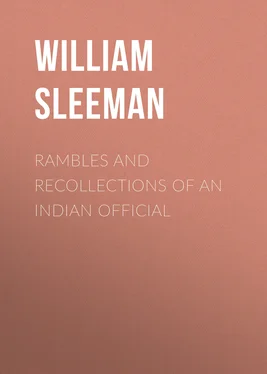William Sleeman - Rambles and Recollections of an Indian Official
Здесь есть возможность читать онлайн «William Sleeman - Rambles and Recollections of an Indian Official» — ознакомительный отрывок электронной книги совершенно бесплатно, а после прочтения отрывка купить полную версию. В некоторых случаях можно слушать аудио, скачать через торрент в формате fb2 и присутствует краткое содержание. Жанр: Путешествия и география, История, foreign_edu, foreign_antique, foreign_prose, на английском языке. Описание произведения, (предисловие) а так же отзывы посетителей доступны на портале библиотеки ЛибКат.
- Название:Rambles and Recollections of an Indian Official
- Автор:
- Жанр:
- Год:неизвестен
- ISBN:нет данных
- Рейтинг книги:4 / 5. Голосов: 1
-
Избранное:Добавить в избранное
- Отзывы:
-
Ваша оценка:
- 80
- 1
- 2
- 3
- 4
- 5
Rambles and Recollections of an Indian Official: краткое содержание, описание и аннотация
Предлагаем к чтению аннотацию, описание, краткое содержание или предисловие (зависит от того, что написал сам автор книги «Rambles and Recollections of an Indian Official»). Если вы не нашли необходимую информацию о книге — напишите в комментариях, мы постараемся отыскать её.
Rambles and Recollections of an Indian Official — читать онлайн ознакомительный отрывок
Ниже представлен текст книги, разбитый по страницам. Система сохранения места последней прочитанной страницы, позволяет с удобством читать онлайн бесплатно книгу «Rambles and Recollections of an Indian Official», без необходимости каждый раз заново искать на чём Вы остановились. Поставьте закладку, и сможете в любой момент перейти на страницу, на которой закончили чтение.
Интервал:
Закладка:
The young Rājā died soon after; and his father, when he resumed the reins of government, wishing to remove the new minister, got him assassinated by Gambhīr Singh, another feudal Rājpūt baron, who, as his reward, received in his turn the seals of office. This man was a most atrocious villain, and employed the public establishments of his chief to plunder travellers on the high road. In 1833 his followers robbed four men, who were carrying treasure to the amount of ten thousand rupees from Sāgar to Jhānsī through Tehrī, and intended to murder them; but, by the sagacity of one of the party, and a lucky accident, they escaped, made their way back to Sāgar, and complained to the magistrate. 282The 283minister discovered the nature of their burdens as they lodged at Tehrī on their way, and sent after them a party of soldiers, with orders to put them in the bed of a rivulet that separated the territory of Orchhā from that of the Jhānsī Rājā. One of the treasure party discovered their object; and, on reaching the bank of the rivulet in a deep grass jungle, he threw down his bundle, dashed unperceived through the grass, and reached a party of travellers whom he saw ascending a hill about half a mile in advance. The myrmidons of the minister, when they found that one had escaped, were afraid to murder the others, but took their treasure. In spite of great obstacles, and with much danger to the families of three of those men, who resided in the capital of Tehrī, the magistrate of Sāgar brought the crime home to the minister, and the Rājā, anxious to avail himself of the occasion to fill his coffers, got him assassinated. The Rājā was then about eighty years of age, and his minister was a strong, athletic, and brave man. One morning while he was sitting with him in private conversation, the former pretended a wish to drink some of the water in which his household god had been washed (the 'chandan mirt'), 284and begged the minister to go and fetch it from the place where it stood by the side of the idol in the court of the palace. As a man cannot take his sword before the idol, the minister put it down, as the Rājā knew he would, and going to the idol, prostrated himself before it preparatory to taking away the water. In that state he was cut down by Bihārī, 285another feudal Rājpūt baron, who aspired to the seals, and some of his friends, who had been placed there on purpose by the Rājā. He obtained the seals by his service, and, as he was allowed to place one brother in command of the forces, and to make another chamberlain, he hoped to retain them longer than any of his predecessors had done. Gambhīr Singh's brother, Jhujhār Singh, and the husband of his sister, hearing of his murder, made off, but were soon pursued and put to death. The widows were all three put into prison, and all the property and estates were confiscated. The movable property amounted to three lakhs of rupees. 286The Rājā boasted to the Governor-General's representative in Bundēlkhand of this act of retributive justice, and pretended that it was executed merely as a punishment for the robbery; but it was with infinite difficulty the merchants could recover from him any share of the plundered property out of that confiscated. The Rājā alleged that, according to our rules , the chief within whose boundary the robbery might have been committed, was obliged to make good the property. On inspection, it was found that the robbery was perpetrated upon the very boundary line, and 'in spite of pride, in erring reason's spite', the Jhānsī Rājā was made to pay one-half of the plundered treasure.
The old Rājā, Bikramājīt, died in June, 1834; and, though his death had been some time expected, he no sooner breathed his last than charges of 'dīnaī', slow poison, were got up, as usual, in the zenana (seraglio).
Here the widow of Rājā Bahādur, a violent and sanguinary woman, was supreme; and she persuaded the present Rājā, a weak old man, to take advantage of the funeral ceremonies to avenge the death of his brother. He did so; and Bihārī, and his three brothers, with above fifty of his relations, were murdered. The widows of the four brothers were the only members of all the families left alive. One of them had a son four months old; another one of two years; the four brothers had no other children. Immediately after the death of their husbands, the two children were snatched from their mothers' breasts, and threatened with instant death unless their mothers pointed out all their ornaments and other property. They did so; and the spoilers having got from them property to the amount of one hundred and fifty thousand rupees, and been assured that there was no more, threw the children over the high wall, by which they were dashed to pieces. The poor widows were tendered as wives to four sweepers, the lowest of all low castes; but the tribe of sweepers would not suffer any of its members to take the widows of men of such high caste and station as wives, notwithstanding the tempting offer of five hundred rupees as a present, and a village in rent-free tenure. 287I secured a promise while at Tehrī that these poor widows should be provided for, as they had, up to that time, been preserved by the good feeling of a little community of the lowest of castes, on whom they had been bestowed as a punishment worse than death, inasmuch as it would disgrace the whole class to which they belonged, the Parihār Rājpūts. 288
Tehrī is a wretched town, without one respectable dwelling- house tenanted beyond the palace, or one merchant, or even shopkeeper of capital and credit. There are some tolerable houses unoccupied and in ruins; and there are a few neat temples built as tombs, or cenotaphs, in or around the city, if city it can be called. The stables and accommodations for all public establishments seem to be all in the same ruinous state as the dwelling-houses. The revenues of the state are spent in feeding Brahmans and religious mendicants of all kinds; and in such idle ceremonies as those at which the Rājā and all his court have just been assisting—ceremonies which concentrate for a few days the most useless of the people of India, the devotee followers (Bairāgīs) of the god Vishnu, and tend to no purpose, either useful or ornamental, to the state or to the people.
This marriage of a stone to a shrub, which takes place every year, is supposed to cost the Rājā, at the most moderate estimate, three lakhs of rupees a year, or one-fourth of his annual revenue. 289The highest officers of which his government is composed receive small beggarly salaries, hardly more than sufficient for their subsistence; and the money they make by indirect means they dare not spend like gentlemen, lest the Rājā might be tempted to take their lives in order to get hold of it. All his feudal barons are of the same tribe as himself, that is, Rājpūts; but they are divided into three clans—Bundēlas, Pawārs, and Chandēls. A Bundēla cannot marry a woman of his own clan, he must take a wife from the Pawārs or Chandēls; and so of the other two clans—no member of one can take a wife from his own clan, but must go to one of the other two for her. They are very much disposed to fight with each other, but not less are they disposed to unite against any third party, not of the same tribe. Braver men do not, I believe, exist than the Rājpūts of Bundēlkhand, who all carry their swords from their infancy. 290
It may be said of the Rājpūts of Mālwa and Central India generally, that the Mogul Emperors of Delhi made the same use of them that the Emperors of Germany and the Popes made of the military chiefs and classes of Europe during the Middle Ages. Industry and the peaceful arts being reduced to agriculture alone under bad government or no government at all, the land remained the only thing worth appropriating; and it accordingly became appropriated by those alone who had the power to do so—by the Hindoo military classes collected around the heads of their clans, and powerful in their union. These held it under the paramount power on the feudal tenure of military service, as militia; or it was appropriated by the paramount power itself, who let it out on allodial tenure to peaceful peasantry. The one was the Zamīndārī, and the other the Mālguzārī tenure of India. 291
Читать дальшеИнтервал:
Закладка:
Похожие книги на «Rambles and Recollections of an Indian Official»
Представляем Вашему вниманию похожие книги на «Rambles and Recollections of an Indian Official» списком для выбора. Мы отобрали схожую по названию и смыслу литературу в надежде предоставить читателям больше вариантов отыскать новые, интересные, ещё непрочитанные произведения.
Обсуждение, отзывы о книге «Rambles and Recollections of an Indian Official» и просто собственные мнения читателей. Оставьте ваши комментарии, напишите, что Вы думаете о произведении, его смысле или главных героях. Укажите что конкретно понравилось, а что нет, и почему Вы так считаете.












